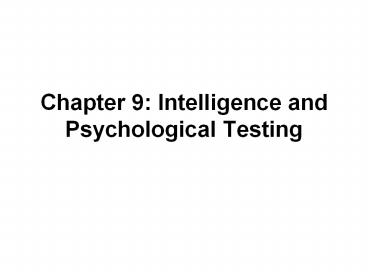Chapter 9: Intelligence and Psychological Testing - PowerPoint PPT Presentation
Title:
Chapter 9: Intelligence and Psychological Testing
Description:
Chapter 9: Intelligence and Psychological Testing * * Sir Francis Galton, 1869, published Hereditary Genius, in which he put forth the notion that success runs in ... – PowerPoint PPT presentation
Number of Views:300
Avg rating:3.0/5.0
Title: Chapter 9: Intelligence and Psychological Testing
1
Chapter 9 Intelligence and Psychological Testing
2
Principle Types of Psychological Tests
- Mental ability tests
- Intelligence general
- Aptitude specific
- Personality scales
- Measure motives, interests, values, and attitudes
3
Key Concepts in Psychological Testing
- Standardization
- Test norms
- Standardization group
- Reliability
- Correlation coefficient
- Validity
- Content validity
- Criterion-related validity
- Construct validity
4
Figure 9.1 Test-retest reliability
5
Figure 9.2 Correlation and reliability
6
Figure 9.3 Criterion-related validity
7
Figure 9.4 Construct validity
8
The Evolution of Intelligence Testing
- Sir Francis Galton (1869)
- Hereditary Genius
- Alfred Binet and Theodore Simon (1905)
- Binet-Simon Intelligence Scale
- Mental age
- Lewis Terman (1916)
- Stanford-Binet Intelligence Scale
- Intelligence Quotient (IQ) MA/CA x 100
- David Wechsler (1955)
- Wechsler Adult Intelligence Scale
9
The Evolution of Intelligence Testing
- Structure of Intelligence
- Spearman
- factor analysis
- g general mental ability
- special abilities (e.g., numerical reasoning,
spatial ability) - Thurstone
- test that evolved into the SAT
- primary mental abilities
10
Figure 9.5 Spearmans g.
11
Figure 9.7 The normal distribution
12
Reliability and Validity of IQ tests
- Exceptionally reliable correlations into the
.90s - Qualified validity valid indicators of
academic/verbal intelligence, not intelligence in
a truly general sense - Correlations
- .40s.50s with school success
- .60s.80s with number of years in school
- Predictive of occupational attainment, debate
about predictiveness of performance
13
Extremes of IntelligenceMental
Retardation/Intellectual Disability
- Diagnosis based on IQ and adaptive testing
- IQ 2 or more SD below mean
- Adaptive skill deficits
- Origination before age 18
- 4 levels mild, moderate, severe, profound
- Mild most common by far
- Causes
- Environmental vs. Biological
14
Figure 9.10 The prevalence and severity of
mental retardation
15
Figure 9.11 Social class and mental retardation
16
Extremes of Intelligence Giftedness
- Identification issues ideals vs. practice
- IQ 2 SD above mean standard
- Creativity, leadership, special talent?
- Stereotypes weak, socially inept, emotionally
troubled - Lewis Terman (1925) largely contradicted
stereotypes - Ellen Winner (1997) moderately vs. profoundly
gifted
17
Extremes of Intelligence Giftedness
- Giftedness and high achievement beyond IQ
- Renzulli (2002) intersection of three factors
- Simonton (2001) drudge theory and inborn talent
18
Intelligence Heredity or Environment?
- Heredity
- Family and twin studies
- Heritability estimates
- Environment
- Adoption studies
- Cumulative deprivation hypothesis
- The Flynn effect
- Interaction
- The concept of the reaction range
19
Figure 9.13 Studies of IQ similarity
20
Figure 9.14 The concept of heritability
21
Figure 9.16 Reaction range
22
Cultural Differences in IQ
- Heritability as an Explanation
- Arthur Jensen (1969)
- Herrnstein and Murray (1994) The Bell Curve
- Environment as an Explanation
- Kamins cornfield analogy socioeconomic
disadvantage - Steele (1997) - stereotype vulnerability
23
Figure 9.17 Genetics and between-group
differences on a trait
24
New Directions in the Study of Intelligence
- Biological Indexes and Correlates of Intelligence
- Reaction time and inspection time
- Brain size
- Cognitive Conceptualizations of Intelligence
- Sternbergs triarchic theory and successful
intelligence - Expanding the Concept of Intelligence
- Gardners multiple intelligences
- Golemans emotional intelligence
25
Figure 9.20 Sternbergs triarchic theory of
intelligence
26
Figure 9.21 Estimated prevalence of
psychological disorders among people who achieved
creative eminence































